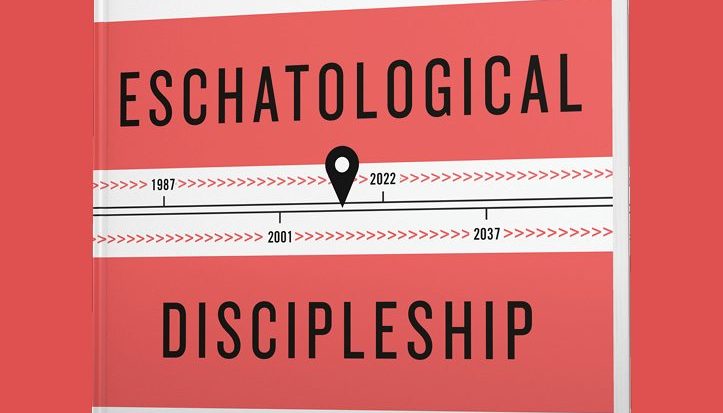The official release date for Eschatological Discipleship was yesterday, April 1. No, this was not an April Fools’ joke. Easter fell on April 1 this year, and I can think of no better day to launch a book on how the cross and resurrection of Jesus transforms our understanding of time and the future.
Christians are Easter people. We look at the present moment in light of what Christ has done for us in the past—the climax of world history when Jesus died for us and was raised from the dead. We also look at the present moment in light of what God has promised for the future, when Jesus returns to set everything under His feet, establish His kingdom, and usher in the new heavens and new earth, so that human beings can fulfill the vocation of worship and love that is our destiny.
Christian work in the present is grounded both by Christ’s work in the past and Christ’s promise for the future. We look backward and forward as we obey.
Not only are we Easter people, but also Second Coming people, too. That doesn’t mean we spend our time dissecting charts and putting up graphs, speculating about the day of Christ’s return. It does mean that there should be a sense of urgency and an infusion of hope in all our activities. We trust that our labor is not in vain (1 Corinthians 15:58). Why? Because Jesus is risen.
When I’m asked to compare Eschatological Discipleship to the book I wrote last year, This Is Our Time, I say that both books are built on the same foundation—the need for Christians to ask “What time is it?” and encounter the present moment with faithful hope. But Eschatological Discipleship goes much deeper into the meaning of that question. In this book, I dig into the biblical foundations for Christian ethics. I also consider other notions of time and progress (the Enlightenment, the Sexual Revolution, and consumerism) and show how the Christian vision must counter these rival understandings.
Eschatological Discipleship brings together biblical exegesis, cultural analysis, theological reflection, historical overview, and evaluations of current church practice. My prayer is that this book will help readers who want to dig deep into the worldview question “What time is it?” in order to grow in faithfulness to the Savior who promises to return and make all things new.
ENDORSEMENTS
Kevin J. Vanhoozer, research professor of systematic theology, Trinity Evangelical Divinity School:
“The philosopher Martin Heidegger famously defined human existence as ‘being-toward-death,’ a posture that generates anxiety in view of our limited time. Trevin Wax does him one better: the Christian life is a matter of being-towards-discipleship, and discipleship is a matter of being-towards-end-time. Disciples take their bearings from the story of Jesus, especially its end: the hope of resurrection. Wax convincingly sets out the biblical basis for ‘eschatological discipleship’, which means the importance of waking up (and staying awake) to the reality that our citizenship in heaven begins now.”
David S. Dockery, president, Trinity Evangelical Divinity School:
“With the publication of Eschatological Discipleship, Trevin Wax has solidified his role as an important Christian voice for the next generation. The call to biblical faithfulness, serious cultural engagement, careful worldview thinking, and long-term eschatological discipleship is masterfully and winsomely presented. Wax has provided us with a clearly written, insightful, well-researched, and illuminating work that will be essential reading for thoughtful Christian leaders in the church and in the academy. It is a genuine joy to recommend this outstanding work.”
Michael F. Bird, lecturer in theology, Ridley College, Melbourne, Australia:
“Trevin Wax’s Eschatological Discipleship is a much needed book that teaches that followers of Jesus are shaped in their thinking and actions by Jesus’s kingship, and by the coming kingdom. God’s future—including our future in it—constructs a worldview and supplies us with wisdom for living in the current age. Ultimately, every worldview, whether secularist or Islamic, has a view of the ‘end.’ By knowing God’s plan for the end, we will be better equipped to work for the kingdom here on earth.”
Bruce Ashford, provost and dean of faculty, Southeastern Baptist Theological Seminary:
“Eschatological Discipleship is a brilliant book. In it, Trevin Wax argues that Christian discipleship cannot be reduced to the transmission of timeless truths that float above history and culture. Instead, Christian discipleship always and necessarily involves confronting the ideologies and rival eschatologies of our own contemporary context. In our own era, he argues, we must confront the Enlightenment, the Sexual Revolution, and modern Consumerism as rival eschatologies, exposing them as frauds and offering the gospel as our one-and-only hope.”
Timothy George, founding dean, Beeson Divinity School of Samford University:
“Discipleship and eschatology are not often thought of in tandem. Discipleship is about following Jesus here and now, while eschatology is about what happens then and there. But in this important book, Trevin Wax shows the coinherence of these two biblical themes. An impressive theological study written with an eye for Great Commission reflection and praxis.”
Michael W. Goheen, director of theological education, Missional Training Center, and adjunct professor of missional theology, Covenant Theological Seminary:
“It is not a matter of whether eschatology will shape the church’s life but only a matter of which one. Discipleship, a burning need in the syncretistic American church, surely needs to be re-envisioned in terms of equipping God’s people to more and more live out of a biblical eschatology of the kingdom. In this book Trevin Wax takes up this challenge and encounters the two most powerful rival eschatologies of our day—the Enlightenment notion of progress and Consumerism. I pray that God will use this book to enable the American church to reimagine discipleship in its missionary setting.”
